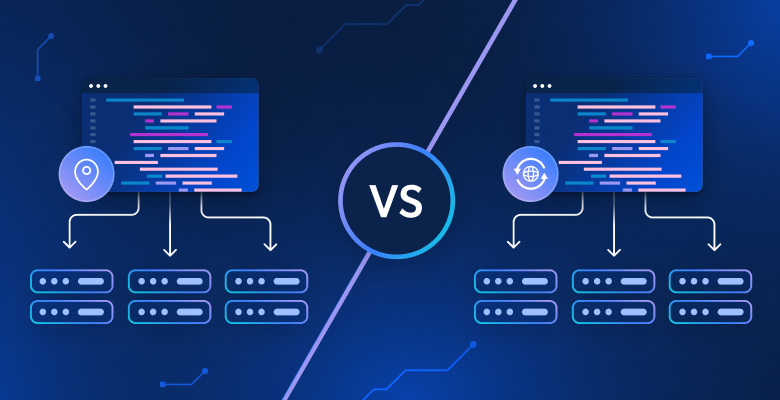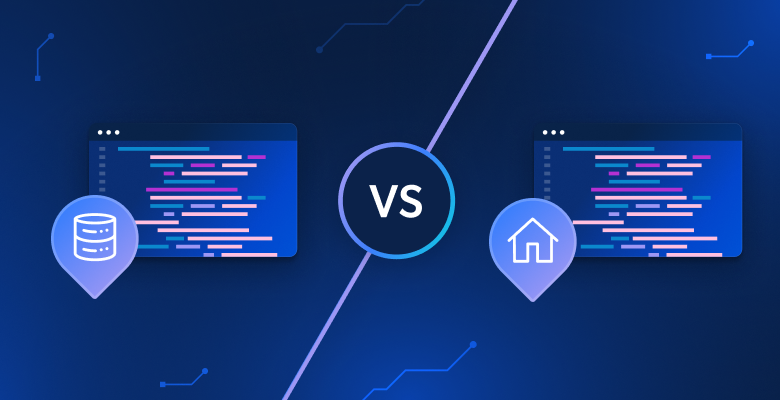Let’s understand how scraping proxies work and dig into the differences between datacenter proxies, residential proxies, ISP proxies, and mobile proxies.
This in-depth guide will cover:
- What is a scraping proxy?
- Why use a proxy for web scraping.
- Types of proxies for web scraping.
- How to choose the right scraping proxy for you.
Time to dive in!
What Is a Scraping Proxy?
A scraping proxy is a type of proxy specifically designed to facilitate web scraping activities. In detail, it is a server that acts as an intermediary between your computer and the target site you are scraping. Check out our article to learn more about what proxy servers are and how they work.
When the scraper makes requests through a proxy, these are first sent to the proxy server, which will then forward them to the website. This means that the destination server will see the requests as coming from the proxy and not from you. That way, you can hide your IP address and location, protecting your identity while avoiding detection and blocking.
Why Use a Proxy for Web Scraping?
Web scraping proxies are useful in several scenarios for a variety of reasons, including:
- Avoid IP blocking: Most anti-bot technologies rely on IP banning to block automated requests from bots. When they detect that requests coming from a specific IP are suspicious, they block them forever or for a limited period of time. By using a proxy, the server can automatically switch between different IP addresses for each request.
- Protect your privacy: Mask your IP address, location, and other information about you. This is essential to avoid undermining the reputation of your IP address and keep your scraping activities anonymous.
- Improve performance: Proxies can provide better performance than contacting the target server directly by caching some data.
- Get around geographical restrictions: Some websites restrict access to certain countries and regions or change their content based on the user’s location. By using a proxy in a specific country rather than another, you can bypass those restrictions and access the target site from anywhere in the world.
If you are planning to do any serious web scraping, then adopting a scraping proxy is a must!
Types of Proxies for Web Scraping
Web scraping proxies can be divided into four categories. Let’s see them all, exploring their characteristics and understanding their pros and cons.
1. Datacenter Proxies
Datacenter proxies are generated using proxy servers in a datacenter. If you are not familiar with that term, a datacenter is a facility that houses servers, computer systems, and networking equipment for data storage and processing.
The IP addresses provided by these proxies are not associated with ISP (Internet Service Providers) or real residential devices. This means that they look more suspicious than traditional IP addresses and are easier to detect and blacklist. Because of that, they are suitable for scraping data from sites that do not have strict anti-scraping measures in place.
Datacenter proxies can be divided into:
- Shared: The same IP address can be used by multiple users at the same time.
- Dedicated: Each IP address is reserved for a single user.
In both cases, they are commonly used for web scraping tasks that require high speed and a lot of bandwidth. Some of the most popular use cases of these proxies are market research, competitor analysis, and e-commerce scraping.
👍 Pros:
- High speed and performance.
- Cost-effective proxies.
- Ideal for tasks that require a large volume of requests and are not sensitive to IP blocking.
👎 Cons:
- Their IPs can easily be detected and blacklisted.
- Not reliable when used against anti-scraping or anti-bot systems.
2. Residential Proxies
Residential proxies provide ISP-registered IP addresses obtained from real residential devices, such as real home computers and smartphones. In other words, they allow you to route web scraping requests through legitimate residential connections. Your requests will appear to the target websites as coming from genuine users in a specific region or area.
As a result, they are an effective solution to access pages protected by IP-based anti-scraping measures. This makes residential proxies valuable for scraping activities that require a high success rate and level of anonymity. In addition, they are used for ad verification and accessing geo-restricted content.
👍 Pros:
- High level of legitimacy thanks to real residential IPs.
- Many IPs available worldwide for location-specific data scraping.
- IP rotation capabilities.
👎Cons:
- Generally more expensive than datacenter proxies.
- Slower compared to datacenter proxies due to reliance on unreliable end-user connections.
3. ISP Proxies
ISP proxies provide static IPs registered to internet service providers but coming from servers in datacenters. For this reason, they are also called residential static proxies. Their reliance on the ISP’s network—and not on end-user connections—makes them faster than residential proxies.
These proxies provide static IPs so reliable that you can trust them for a lifetime. On the other hand, obtaining ISP-compliant IPs is not easy. So, there are usually significantly fewer IPs available than residential IPs.
ISP proxies are great tools for dealing with region-restricted sites and gathering data from sites with strict IP-based protection. Typically, SEO professionals employ them to monitor search engine rankings from different locations around the world. Similarly, companies use them to gather market data from different regions or manage worldwide social media operations.
👍 Pros:
- Highly-reliable IPs.
- Faster than residential IPs.
- Trusted by many companies, from small businesses to Fortune 500 enterprises.
👎Cons:
- Not many IPs available and in a limited range of countries.
- IP rotation is not available, as they offer static IPs.
4. Mobile Proxies
Mobile proxies guarantee IP addresses coming from mobile devices connected to 3G, 4G, and 5G cellular networks. In particular, they enable you to route requests through a mobile connection, providing the highest level of legitimacy.
These proxies are great for dealing with social media platforms, like Facebook, Threads, and Instagram. Since you are getting real-world mobile IPs, expect fewer blocks and verification prompts.
👍 Pros:
- Highly legitimate IPs.
- Effective for avoiding blocks and verification prompts on mobile-based sites such as social platforms.
- Great tool for mobile testing.
👎 Cons:
- Generally more expensive than other proxy types.
- Slower compared to datacenter proxies due to reliance on mobile networks.
How to Choose the Right Scraping Proxy for You
Selecting the right type of scraping proxy depends on your specific project requirements. During this evaluation process, sort out the speed, level of anonymity, and scalability desired. Then, understand the need for location-specific IPs and the budget available. Finally, take into account the anti-scraping measures adopted by the target website and the nature of the data to retrieve.
Once you have made a decision, it only remains to find a reliable proxy service provider.
Keep in mind that there are dozens of proxy providers out there. So, read our guide to explore the criteria to consider for choosing the best proxy provider.
Always test the proxy servers offered by the provider, especially of the types you need. If they do not offer a free trial and/or a refund policy, you can confidently rule them out. Before committing to a paid plan, you need to make sure that they meet your project’s unique demands and goals. Embracing a company’s services always comes with vendor lock-in. To avoid the switching costs, you must be sure you are picking the provider of the best proxies for web scraping on the market!
Conclusion
In this article, you saw what scraping proxies are, how these servers work, and why adopt them when retrieving data from the Web. You also realized that there are many proxy providers online, and reviewing them all will take months. Since we do not want you to lose time and energy on such a tedious task, we have a solution for you!
Bright Data controls the best proxies for web scraping, serving Fortune 500 companies and over 20,000 customers. Its worldwide proxy network involves:
- Datacenter proxies – Over 770,000 datacenter IPs.
- Residential proxies – Over 150M residential IPs in more than 195 countries.
- ISP proxies – Over 700,000 ISP IPs.
- Mobile proxies – Over 7M mobile IPs.
Overall, this is one of the largest and most reliable scraping-oriented proxy networks on the market. But Bright Data is more than just a proxy provider! It also offers top-notch web scraping services, including a scraping browser, a web scraping API, and a SERP API.
With a vast global network and extensive IP pools, Bright Data guarantees exceptional reliability, availability, and performance. If you need help, the industry-awarded customer support available 24/7 will offer assistance through multiple channels. This makes Bright Data the vendor of the best scraping proxies for any online data extraction task.







